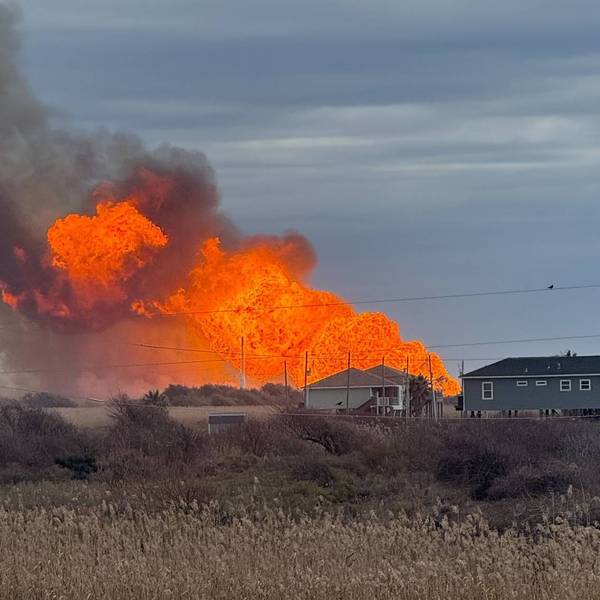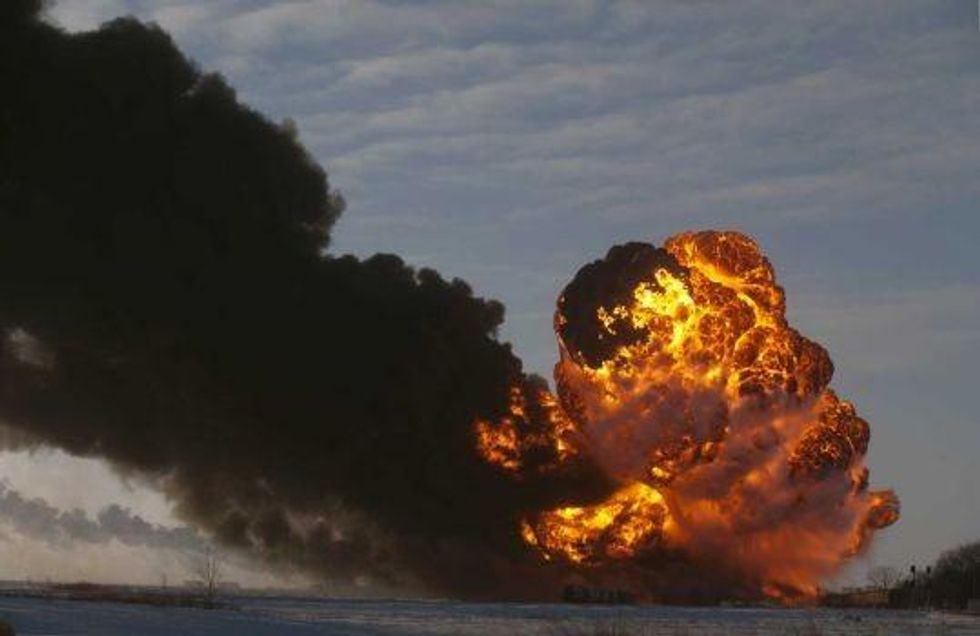Nearly 24 hours after a massive oil train collision and explosion led to the evacuation of a small North Dakota town, residents are still not allowed to return to their homes and the extent of the damage had not yet been tallied.
"Once I can stand up, look you in the eye and say they're safe to come home, that's exactly what we're going to do. We're just not there yet," Cass County Sheriff Paul Laney told a news conference Tuesday afternoon.
The collision involved a 106-car BNSF Railway Co oil train, which slammed into a derailed grain train on Monday afternoon, setting off large-scale explosions and a plume of toxic smoke that could be seen for 25 miles near the small town of Casselton.
As of Tuesday afternoon, all of the fires had not yet been put out and the majority of residents closest to the accident were told to stay away from their homes.
Contrary to the Sheriff's advice, Dr. Alan Nye, a toxicologist hired by the BNSF Railway Co to monitor the crash, told Reuters that the air quality was fine and particulate levels were falling, with tests showing a "good range."
The National Transportation Safety Board launched an investigation which officials said would examine the train recorder, the signal system, the condition of the train operators, train and tracks, as well as the response to the derailment, Associated Press reports.
Robert Sumwalt, a NTSB board member, said the tankers that had exploded were a type that has shown a tendency to rupture in other accidents, model DOT-111.
Calling for changes in U.S. fuel transportation, Mayor Ed McConnell said early Tuesday that it was time to "have a conversation" with federal lawmakers about the dangers of transporting oil by rail, the AP reports.
The collision occurred just outside of Casselton, a town of 2,400 people about 25 miles west of Fargo. The rail tracks run straight through the middle of Casselton, AP reports and McConnell said dozens of people could have been killed if the accident happened in town.
"There have been numerous derailments in this area," he told AP. "It's almost gotten to the point that it looks like not if we're going to have an accident, it's when. We dodged a bullet by having it out of town, but this is too close for comfort."
"The number of crude oil carloads hauled by U.S. railroads surged from 10,840 in 2009 to a projected 400,000 this year," AP reports.
Some have drawn comparisons with Monday's crash to the last summer's disaster in Lac-Megantic, Quebec when a train carrying crude from North Dakota's Bakken oil patch derailed in town causing a massive explosion and the deaths of 47 people.
While McConnell fell short of criticizing the oil industry itself for the incident, calling instead for oil to be transported via pipeline, critics of the fossil fuel industry argue there is no safe or clean way to transport oil.
While high velocity crashes are less of an issue with pipeline transport, pipelines spill more often than rail. "Over the past decade, pipelines have spilled 474,441 barrels of oil, compared to the 2,268 barrels spilled over the same time by rail," reports Bryan Walsh at Time.
"Far from getting safer over time," anti-tar sands environmental groups recently reported, "documents obtained from the Canadian government...[show] that the rate of pipeline incidents has actually doubled since 2000."
As Canada's CBC news reported at the time, "By 2011, safety-related incidents -- covering everything from unintentional fires to spills -- rose from one to two for every 1,000 kilometers of federally-regulated pipeline. That reflects an increase from 45 total incidents in 2000 to 142 in 2011."
_______________________




